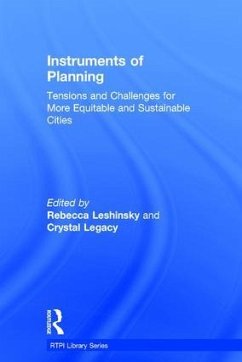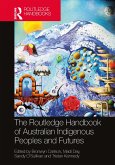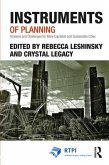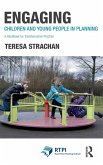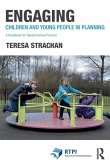Instruments of Planning
Tensions and challenges for more equitable and sustainable cities
Herausgeber: Leshinsky, Rebecca; Legacy, Crystal
Instruments of Planning
Tensions and challenges for more equitable and sustainable cities
Herausgeber: Leshinsky, Rebecca; Legacy, Crystal
- Gebundenes Buch
- Merkliste
- Auf die Merkliste
- Bewerten Bewerten
- Teilen
- Produkt teilen
- Produkterinnerung
- Produkterinnerung
Instruments of Planning explores planningâ s instrumentality to deliver important social and environmental outcomes in neoliberal planning landscapes.
Andere Kunden interessierten sich auch für
![The Routledge Handbook of Australian Indigenous Peoples and Futures The Routledge Handbook of Australian Indigenous Peoples and Futures]() The Routledge Handbook of Australian Indigenous Peoples and Futures242,99 €
The Routledge Handbook of Australian Indigenous Peoples and Futures242,99 €![Legal Geography Legal Geography]() Legal Geography40,99 €
Legal Geography40,99 €![Instruments of Planning Instruments of Planning]() Instruments of Planning80,99 €
Instruments of Planning80,99 €![Governance for Pro-Poor Urban Development Governance for Pro-Poor Urban Development]() Franklin Obeng-OdoomGovernance for Pro-Poor Urban Development48,99 €
Franklin Obeng-OdoomGovernance for Pro-Poor Urban Development48,99 €![Love, Intimacy and Online Dating Love, Intimacy and Online Dating]() Lisa PortolanLove, Intimacy and Online Dating38,99 €
Lisa PortolanLove, Intimacy and Online Dating38,99 €![Engaging Children and Young People in Planning Engaging Children and Young People in Planning]() Teresa StrachanEngaging Children and Young People in Planning152,99 €
Teresa StrachanEngaging Children and Young People in Planning152,99 €![Engaging Children and Young People in Planning Engaging Children and Young People in Planning]() Teresa StrachanEngaging Children and Young People in Planning42,99 €
Teresa StrachanEngaging Children and Young People in Planning42,99 €-
-
-
Instruments of Planning explores planningâ s instrumentality to deliver important social and environmental outcomes in neoliberal planning landscapes.
Hinweis: Dieser Artikel kann nur an eine deutsche Lieferadresse ausgeliefert werden.
Hinweis: Dieser Artikel kann nur an eine deutsche Lieferadresse ausgeliefert werden.
Produktdetails
- Produktdetails
- RTPI Library Series
- Verlag: Taylor & Francis Ltd
- Seitenzahl: 280
- Erscheinungstermin: 25. August 2015
- Englisch
- Abmessung: 240mm x 161mm x 20mm
- Gewicht: 656g
- ISBN-13: 9781138812048
- ISBN-10: 1138812048
- Artikelnr.: 42796851
- Herstellerkennzeichnung
- Libri GmbH
- Europaallee 1
- 36244 Bad Hersfeld
- gpsr@libri.de
- RTPI Library Series
- Verlag: Taylor & Francis Ltd
- Seitenzahl: 280
- Erscheinungstermin: 25. August 2015
- Englisch
- Abmessung: 240mm x 161mm x 20mm
- Gewicht: 656g
- ISBN-13: 9781138812048
- ISBN-10: 1138812048
- Artikelnr.: 42796851
- Herstellerkennzeichnung
- Libri GmbH
- Europaallee 1
- 36244 Bad Hersfeld
- gpsr@libri.de
Rebecca Leshinsky is a Senior Lecturer in Property, School of Property, Construction and Project Management, RMIT University, Melbourne, Australia, and the author of a number of practitioner books in the areas of property and strata law. Crystal Legacy is an Australian Research Council (DECRA) Fellow and a Vice Chancellor's Research Fellow in the Centre for Urban Research at RMIT University. She is co-editor of Building Inclusive Cities: Women's safety and the right to the city (Routledge).
1. Planning instruments and the urban change process Part 1. Planning
challenges in a context of discontinuous growth 2. Towards equitable
intensification: Restricting developer gain and compensating planning costs
3. Freedom's prospect? Re-thinking red and green tape reform as a planning
instrument 4. The problem/solution nexus and its effects on public
consultation Part 2. Designing strategies for change 5. Community
deliberation as a procedural planning tool: Examination of Vancouver and
Melbourne 6. Targets for affordable housing: Supporting equitable and
sustainable urban growth 7. Social impact assessment: Strategic litigation
tool for planning law decision makers 8. A design-led approach for enabling
collective imagining of sustainable urban futures Part 3. Instruments to
implement change 9. Would you like a code with that? Place-based planning
and mapping neighbourhood fields of care 10. Transferable development
credits put growth in its place 11. Managing urban intensification through
conservation covenants 12. Regenerating cities: Creating the opportunity
for greyfield precinct infill development Part 4. Technology in planning:
Supporting urban policy and decision-making 13. Policy and planning on the
interface of socio-technical systems: Novel approaches to policy
development 14. Engaging the greyfields: Community engagement and co-design
in residential redevelopment of public housing 15. Technology in urban
planning: Spatial hedonic house price model as an information tool 16.
Instruments of planning: tensions and challenges for more equitable and
sustainable cities
challenges in a context of discontinuous growth 2. Towards equitable
intensification: Restricting developer gain and compensating planning costs
3. Freedom's prospect? Re-thinking red and green tape reform as a planning
instrument 4. The problem/solution nexus and its effects on public
consultation Part 2. Designing strategies for change 5. Community
deliberation as a procedural planning tool: Examination of Vancouver and
Melbourne 6. Targets for affordable housing: Supporting equitable and
sustainable urban growth 7. Social impact assessment: Strategic litigation
tool for planning law decision makers 8. A design-led approach for enabling
collective imagining of sustainable urban futures Part 3. Instruments to
implement change 9. Would you like a code with that? Place-based planning
and mapping neighbourhood fields of care 10. Transferable development
credits put growth in its place 11. Managing urban intensification through
conservation covenants 12. Regenerating cities: Creating the opportunity
for greyfield precinct infill development Part 4. Technology in planning:
Supporting urban policy and decision-making 13. Policy and planning on the
interface of socio-technical systems: Novel approaches to policy
development 14. Engaging the greyfields: Community engagement and co-design
in residential redevelopment of public housing 15. Technology in urban
planning: Spatial hedonic house price model as an information tool 16.
Instruments of planning: tensions and challenges for more equitable and
sustainable cities
1. Planning instruments and the urban change process Part 1. Planning
challenges in a context of discontinuous growth 2. Towards equitable
intensification: Restricting developer gain and compensating planning costs
3. Freedom's prospect? Re-thinking red and green tape reform as a planning
instrument 4. The problem/solution nexus and its effects on public
consultation Part 2. Designing strategies for change 5. Community
deliberation as a procedural planning tool: Examination of Vancouver and
Melbourne 6. Targets for affordable housing: Supporting equitable and
sustainable urban growth 7. Social impact assessment: Strategic litigation
tool for planning law decision makers 8. A design-led approach for enabling
collective imagining of sustainable urban futures Part 3. Instruments to
implement change 9. Would you like a code with that? Place-based planning
and mapping neighbourhood fields of care 10. Transferable development
credits put growth in its place 11. Managing urban intensification through
conservation covenants 12. Regenerating cities: Creating the opportunity
for greyfield precinct infill development Part 4. Technology in planning:
Supporting urban policy and decision-making 13. Policy and planning on the
interface of socio-technical systems: Novel approaches to policy
development 14. Engaging the greyfields: Community engagement and co-design
in residential redevelopment of public housing 15. Technology in urban
planning: Spatial hedonic house price model as an information tool 16.
Instruments of planning: tensions and challenges for more equitable and
sustainable cities
challenges in a context of discontinuous growth 2. Towards equitable
intensification: Restricting developer gain and compensating planning costs
3. Freedom's prospect? Re-thinking red and green tape reform as a planning
instrument 4. The problem/solution nexus and its effects on public
consultation Part 2. Designing strategies for change 5. Community
deliberation as a procedural planning tool: Examination of Vancouver and
Melbourne 6. Targets for affordable housing: Supporting equitable and
sustainable urban growth 7. Social impact assessment: Strategic litigation
tool for planning law decision makers 8. A design-led approach for enabling
collective imagining of sustainable urban futures Part 3. Instruments to
implement change 9. Would you like a code with that? Place-based planning
and mapping neighbourhood fields of care 10. Transferable development
credits put growth in its place 11. Managing urban intensification through
conservation covenants 12. Regenerating cities: Creating the opportunity
for greyfield precinct infill development Part 4. Technology in planning:
Supporting urban policy and decision-making 13. Policy and planning on the
interface of socio-technical systems: Novel approaches to policy
development 14. Engaging the greyfields: Community engagement and co-design
in residential redevelopment of public housing 15. Technology in urban
planning: Spatial hedonic house price model as an information tool 16.
Instruments of planning: tensions and challenges for more equitable and
sustainable cities

